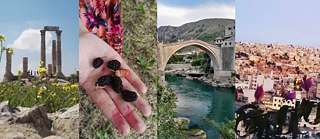"Do not spend more than three days in a city. On the first day, you can claim not to know the language in order to be alone with your thoughts. On the second day, you can ask local people for directions. On the third day, you can show tourists the way to the mosque where the Tarawih prayers are being held and where to find the best beer. But on the fourth day, you have no choice but to leave."
Mostar, 13 June 2017:
The air is so hot and humid that my clothes stick to my body. Amid the din, the streets hide the secrets of the passers-by dragging their suitcases; the fish exhale bubbles at the river’s surface that quickly dissolve; and the waiter closes the bill holder, hiding a residual laugh which makes the table legs tremble, whilst pocketing the change. A king’s head on a coin does not make you listen; it cannot give you anything, nor does it demand allegiance. Coins are circular, so there is no corner into which I can squeeze my life, waiting for the end of times, so I spread my laughter over the cafe tables as much as I can. And then I fall silent.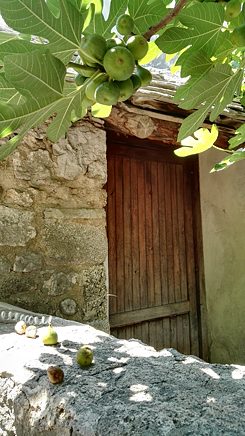 ©Nermina Al-Rifai
Mostar has a 53-metre-high stone bridge which connects the two banks of the Neretva River, but that does not mean that it can connect the residents on either side. Since 1993, the city has been divided between Bosnians and Croats. The visitor only has to glance at the names of the shops to know the origin of their owners. Those who call their bakeries Pekara, are Bosnian; those who call them Pekarna, are Croatian. Those who call their pharmacy Apoteka, are Bosnian; and those who call them Ljekarna, are Croatian, … the list goes on.
©Nermina Al-Rifai
Mostar has a 53-metre-high stone bridge which connects the two banks of the Neretva River, but that does not mean that it can connect the residents on either side. Since 1993, the city has been divided between Bosnians and Croats. The visitor only has to glance at the names of the shops to know the origin of their owners. Those who call their bakeries Pekara, are Bosnian; those who call them Pekarna, are Croatian. Those who call their pharmacy Apoteka, are Bosnian; and those who call them Ljekarna, are Croatian, … the list goes on.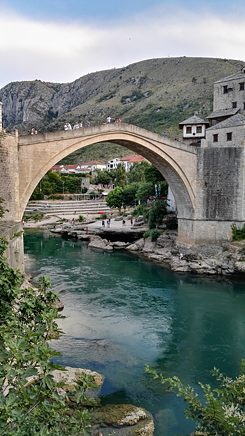 The old bridge in Mostar | ©Nermina Al-Rifai
The old bridge in Mostar | ©Nermina Al-Rifai
At a table close to me, a local was explaining at length to the tourists sitting with him about the Bosnian philosophy of dipping sugar cubes in coffee. I tried not to eavesdrop and occupied myself by counting the ripe figs falling from the tree in front of me.
Then I opened the notes page on my mobile phone and wrote:
"I'm the mixed race and I'm the fig basket ..
I'm the fig..
Every time I turned ripe, I fell"!
I'm the fig..
Every time I turned ripe, I fell"!
Today, I hold a Bosnian passport, my two daughters hold Croatian passports, and we live in Jordan. Whenever we argue, I see the Neretva River flowing between us, and I fall to the ground like a fig!
Amman, 13 June 2018:
 The old bridge in Mostar | ©Nermina Al-Rifai
The old bridge in Mostar | ©Nermina Al-Rifai
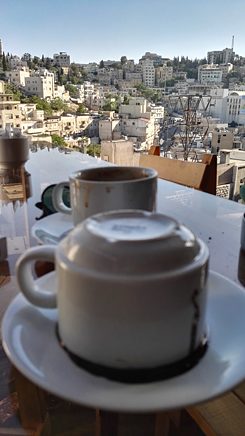 ©Nermina Al-Rifai
Today I’m 32 years and five months old; I drink my coffee unsweetened here. Dipping sugar cubes in coffee no longer meant anything to me once I realised that salt was more me. I no longer look for corners in which to hide away. Recently, I began to spend time as a coin; it was made round, making it easier to roll towards its end.
©Nermina Al-Rifai
Today I’m 32 years and five months old; I drink my coffee unsweetened here. Dipping sugar cubes in coffee no longer meant anything to me once I realised that salt was more me. I no longer look for corners in which to hide away. Recently, I began to spend time as a coin; it was made round, making it easier to roll towards its end.I fall again and again like a fig in a strange land; the bubbles in my lungs remind me that I, like a fish, jump from water to water, clinging vainly to memory and place.
Banja Luka, 14 June 2017:
I miss Amman, my soul flies to it with the wind and then scatters over the tops of its seven mountains. Banja Luka is quieter than it should be, quieter than even an Amman girl can endure. Its streets are so clean that the anxiety that often accompanies me whenever I put on white shoes seems out of place. How boring to wear all these white things without the worry of getting them dirty! The shelves of my grandmother's house are similarly boring. There’s no dust here. No layers of sand gather on them the instant I open the window; fingers poised to draw a heart or a star are destined to remain idle. Clean shelves have no traces and do not preserve the past!The house is as quiet as the city in the centre of which it stands, as if it had never been through a day of war! As if it had forgotten the sound of gunpowder, shelling and mines blowing up people's legs and arms; as if the flames which flared from 1991 to 1995 had vanished from its memory and disappeared from history.
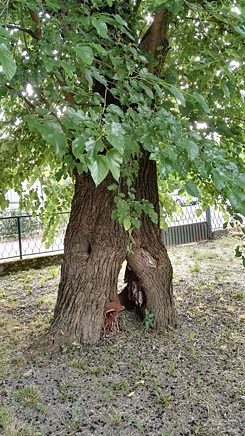 Mulberry tree in the Banja Luka house | ©Nermina Al-Rifai
As a child, I was always getting my fingers and clothes dirty from the blood-red fruit on the mulberry tree in the garden. It taught me that red is a delicious colour which dissolves in the heart before the mouth, yet now I am saddened by the notion that this same colour is the colour of blood, war and death. And it saddens me even more to think that a child might associate red with blood and death before connecting it to the sweetness of the berries on one’s fingers.
Mulberry tree in the Banja Luka house | ©Nermina Al-Rifai
As a child, I was always getting my fingers and clothes dirty from the blood-red fruit on the mulberry tree in the garden. It taught me that red is a delicious colour which dissolves in the heart before the mouth, yet now I am saddened by the notion that this same colour is the colour of blood, war and death. And it saddens me even more to think that a child might associate red with blood and death before connecting it to the sweetness of the berries on one’s fingers.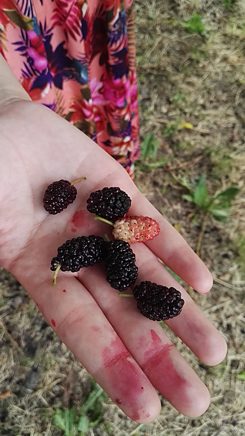 Mulberry tree in the Banja Luka house | ©Nermina Al-Rifai
Mulberry tree in the Banja Luka house | ©Nermina Al-Rifai
These days I avoid any memory of the left-over flavours on my fingers. I ponder at the half-empty tree trunk in front of me, but instead I see the tree planted in front of the balcony of my house in Amman. I try to imagine the windows of the two houses and I sit in the wind!
Amman, 14 June 2018:
I miss Banja Luka. I see myself sitting in the cafe overlooking the River Verbas and I listen to a band playing old songs on cellos; they remind me of my grandmother’s ditties. I can’t recall how I got to the cafe and I don’t know how I’ll get back to the house, but I’m confident that I won’t get lost in cities divided by rivers. The easy solution is to walk along the river or along a path intersecting with it. I abandon my feet to the asphalt and the light of the street lamps reflecting upon it. I shake the trunk and my heart falls with the water, sweet and fresh. I walk silently, realising that I don’t need the voice of the woman coming out of my phone giving directions.I didn’t get lost that day, but when I got there I stood as usual in front of the old walls, cracked tiles and ancient trees. I asked myself again and again: all those years ago, wasn’t I just a young girl washing her toys under the garden tap? Wasn’t it here that my grandmother grew tomatoes, onions and potatoes?
In front of the house are a few stone steps, where someone has hung a washing line on the banister, and the line bends with the stairs. There, I left my childhood clothes wet, and they are still not dry.
On the balcony in Amman, there are lots of clay pots in which I grow onions and potatoes, but the soil smells different. The bubbles in my lungs still yearn for the air, water and soil of Banja Luka
Sarajevo, 15 June 2017:
There’s music coming from somewhere, but I don’t know where. It sounds as if it’s from far away, as it’s only an echo. Fayrouz's voice grows louder and she sings: "Natarouna Ktir” (They waited a long time for us at the Darina stop).In Sarajevo, there isn’t a stop called "Darina". I know because I studied the maps at length and I remember the names of the bus and tram stops. The tram in Sarajevo has been there since 1885. It was the first city in Europe and the second in the world after San Francisco to use trams as part of its transportation network. That means that people have been waiting at the tram stops from the beginning until the end of time!
I turn around again, only then noticing that my heart is listening to its own rhythm emanating from afar, from downtown Amman to be precise, from a cafe close to the Citadel in Hercules’ temple, close to the Byzantine church and to the Umayyad palace. The song differed from the tune in my mind, but it did not diminish the warmth which washed over me when I heard the voice of Umm Kulthum intersecting with the voices of Nancy Ajram and Amr Diab, mixed in with the voices of hawkers calling "mint ice cream" and "crisps and popcorn".
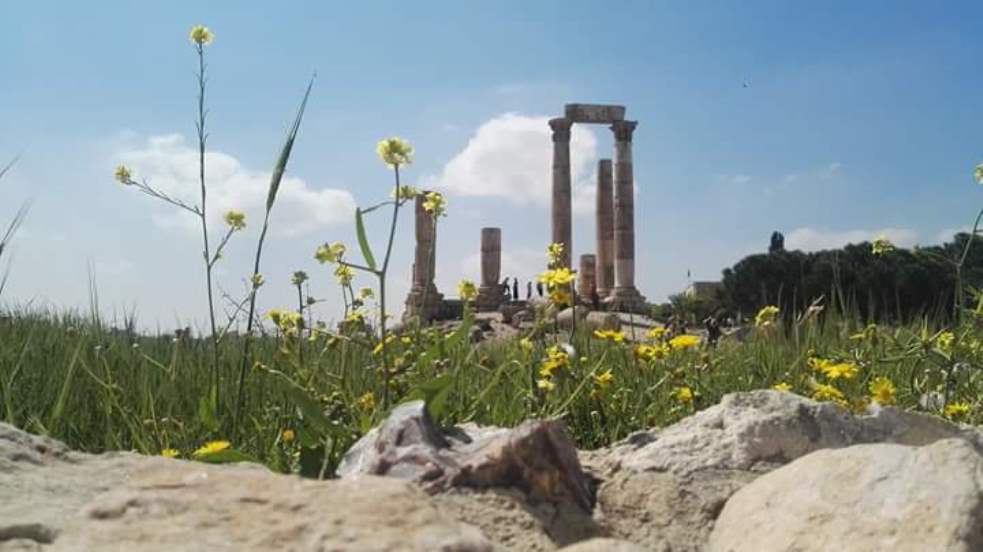 The citadel in Amman | ©Nermina Al-Rifai
Finding where Darina is, whether in Sarajevo or Amman, does not matter, but I am on a quest for something. And perhaps, I thought, someone is waiting for me, somewhere!
The citadel in Amman | ©Nermina Al-Rifai
Finding where Darina is, whether in Sarajevo or Amman, does not matter, but I am on a quest for something. And perhaps, I thought, someone is waiting for me, somewhere!Lost in the wilderness, Fayrouz sings: "We didn’t get to know their names, nor they, ours". I must have forgotten my name!
Amman, 15 June 2018:
Stuck in traffic in this overcrowded city. There’s the roundabout by the Ministry of the Interior, the Third Circle, the Second Circle, and other roundabouts connected to streets, tunnels and bridges, some of which have not yet been completed, rendering the traffic even more chaotic. Cars are barely moving in one of the tunnels and I'm close to suffocating. At this moment, the Sarajevo Tunnel springs to mind. Built in 1993 and running from Butmir airport to a nondescript house in the Dobrinja neighbourhood, people, medicine, food and weapons were smuggled through it during the four years of the siege of the city. More than 800 metres in length and 1.6 metres in height, the tunnel was dug by candlelight, using pickaxes and handcarts. It was supported by 45 tons of steel. Its wooden floor was constructed using the doors of houses and wardrobes. On top of the problems they had to overcome in terms of the tunnel structure, lighting and lack of air, they faced the difficulties of how to pump out the groundwater and where to dump the excavated soil. All this has now been reduced to 20 metres at the entrance to the tunnel, turned into a museum for visitors. Some 780 metres remain drowned in darkness and in the tears of those who dug the tunnel 25 years ago.Those who built the tunnel were all Bosnians – engineers, soldiers and civilians ; the only non-Bosnian involved was a Palestinian doctor called Youssef Hajir. From time immemorial, whenever there’s a struggle for life and freedom, Palestine has always been there!
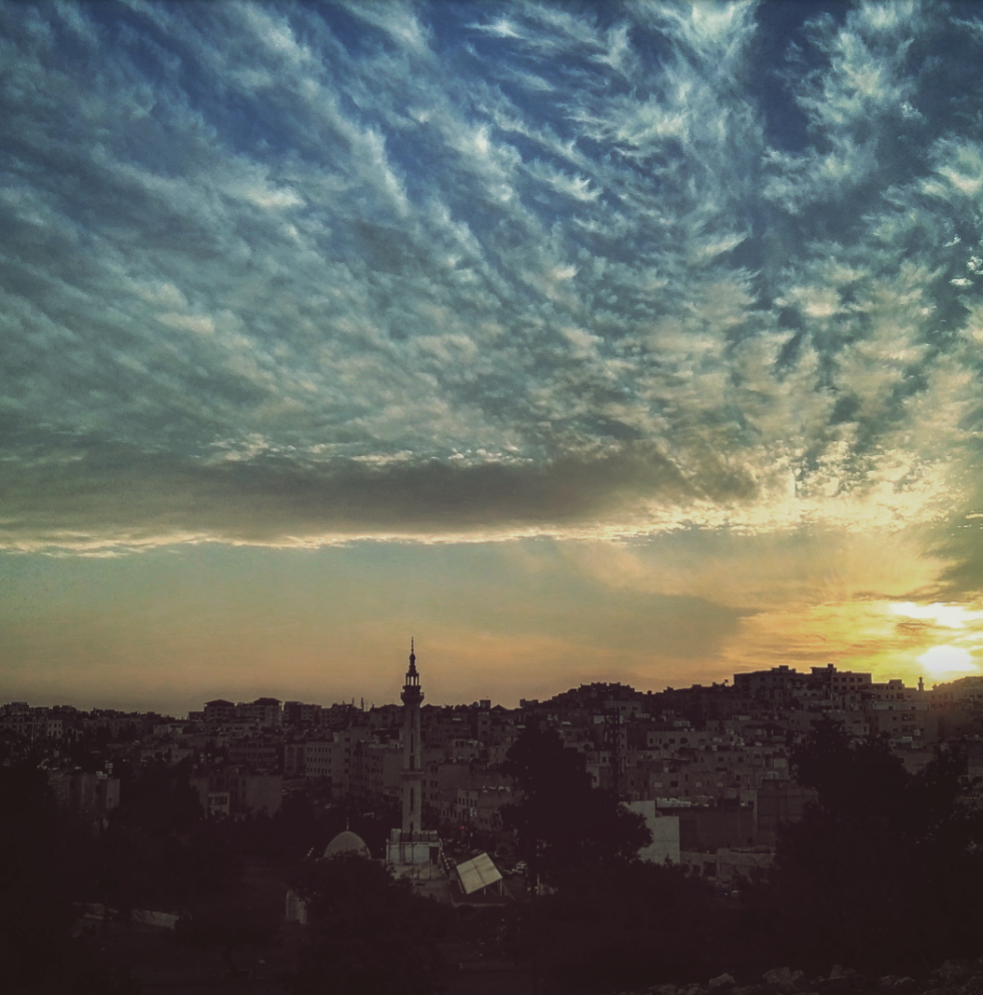 ©Nermina Al-Rifai
Suddenly, over 25 car horns erupt behind me. I put my foot down on the accelerator and drive away from Amman’s tunnels, trying to forget that, had I not left Sarajevo in 1991 shortly before the outbreak of the war, I would surely have been one of those who passed through the Sarajevo Tunnel. Or I would have been one of those who stayed behind!
©Nermina Al-Rifai
Suddenly, over 25 car horns erupt behind me. I put my foot down on the accelerator and drive away from Amman’s tunnels, trying to forget that, had I not left Sarajevo in 1991 shortly before the outbreak of the war, I would surely have been one of those who passed through the Sarajevo Tunnel. Or I would have been one of those who stayed behind!
Travnik, 16 June 2017:
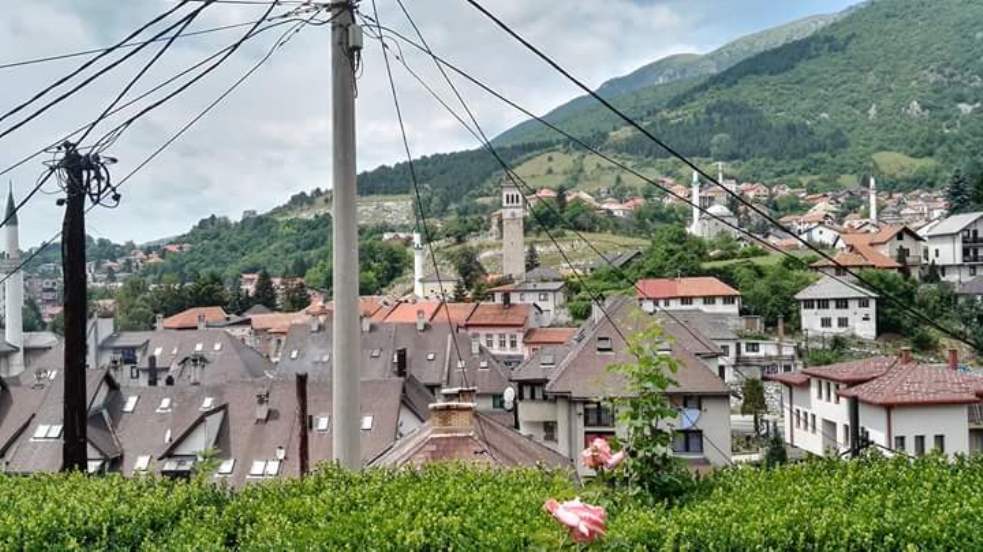 ©Nermina Al-Rifai
My grandmother and mother were born here. It’s where it all began. There are densely-wooded mountains and rivers flowing as if in a direct line to the clouds. The city centre has in its middle what is called the "blue water", which is a semi-circle of water, with greenery and cafes lining its edges. The most famous cafe is called “Lutvina Kahva”, where coffee is served with a homemade cigarette and a box of matches. I almost sang Majida El Roumi’s song: "Out of his coat came out the newspaper and the matchbox” when I realised that somewhere on this earth is a man who uses matches instead of a lighter! Finishing my coffee, I went to pay for it, only to be told that someone had already paid for me. I looked in the direction the waiter pointed and it was the honey seller standing on the pavement, setting out dozens of pots of natural honey, each with its own amazing colours!
©Nermina Al-Rifai
My grandmother and mother were born here. It’s where it all began. There are densely-wooded mountains and rivers flowing as if in a direct line to the clouds. The city centre has in its middle what is called the "blue water", which is a semi-circle of water, with greenery and cafes lining its edges. The most famous cafe is called “Lutvina Kahva”, where coffee is served with a homemade cigarette and a box of matches. I almost sang Majida El Roumi’s song: "Out of his coat came out the newspaper and the matchbox” when I realised that somewhere on this earth is a man who uses matches instead of a lighter! Finishing my coffee, I went to pay for it, only to be told that someone had already paid for me. I looked in the direction the waiter pointed and it was the honey seller standing on the pavement, setting out dozens of pots of natural honey, each with its own amazing colours!He laughed at me. I remember his laugh very well, because at that moment I learned that it was possible to find honey while being immersed in the search for a matchbox!
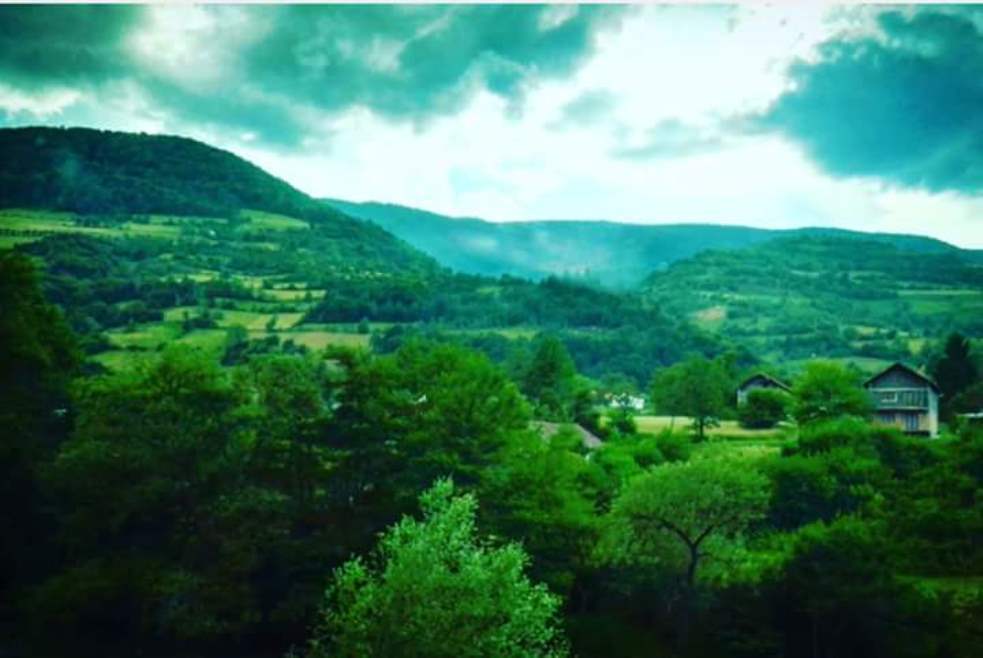 Travnik mountains | ©Nermina Al-Rifai
Travnik mountains | ©Nermina Al-Rifai
Amman, 17 June 2018:
I’m sitting in a cafe where everyone uses lighters, but I can’t find a honey seller.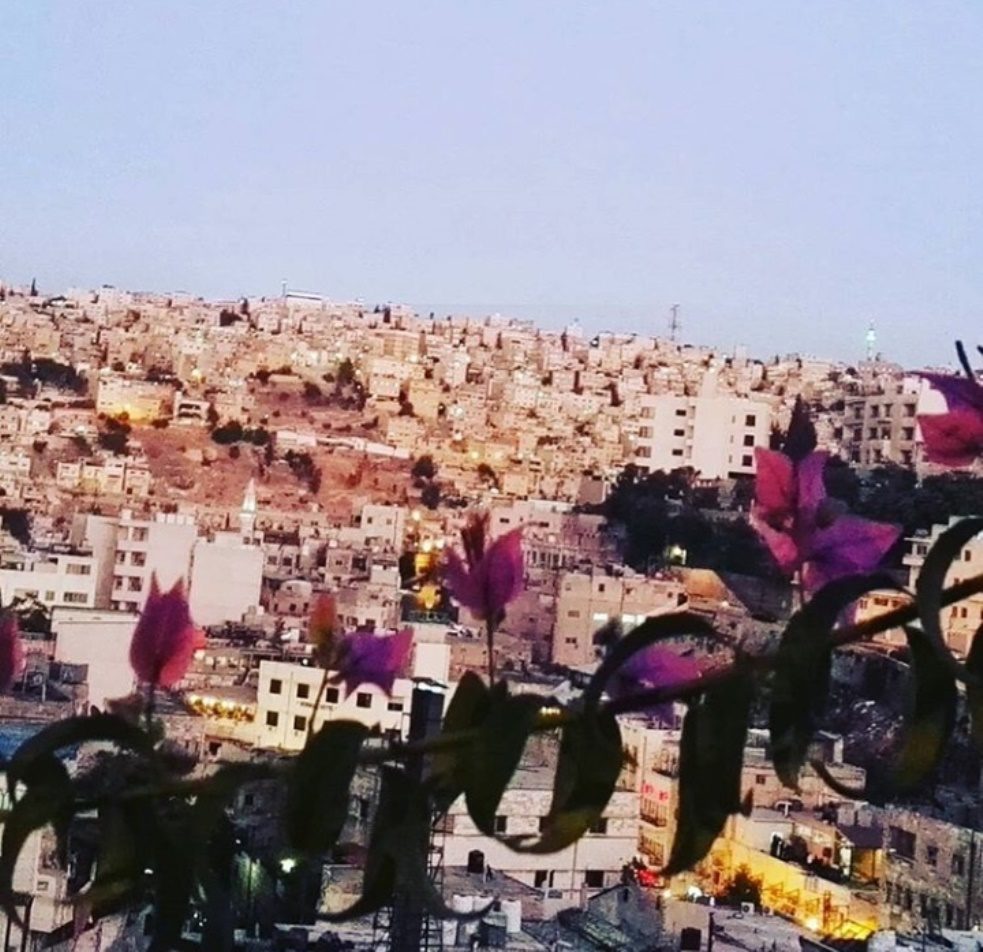 ©Nermina Al-Rifai
©Nermina Al-Rifai
Amman, 18 June 2018:
I’m reading the note I made on my mobile phone a year ago when I was eating a Bosnian kebab with onion rings in the middle of Bas Carsija in Sarajevo. That day, I remember inhaling deeply the moist air of the Miljacka River beside me and writing:
"Do not spend more than three days in a city. On the first day, you can claim not to know the language in order to be alone with your thoughts. On the second day, you can ask local people for directions. On the third day, you can show tourists the way to the mosque where the Tarawih prayers are being held and where to find the best beer. But on the fourth day, you have no choice but to leave."
Now, I’m sitting in Hashim’s restaurant in downtown Amman. The air is dry and I don’t understand where the humidity which is filling my lungs is coming from. I’m eating hummus (chickpeas) and Baba ghanoush (aubergine dip), and the last sentence weighs heavily on me, while I keep turning it over non-stop in my mind:
“You’ll have no choice but to leave. You’ll have no choice but……
to leave!”
to leave!”
March 2018
